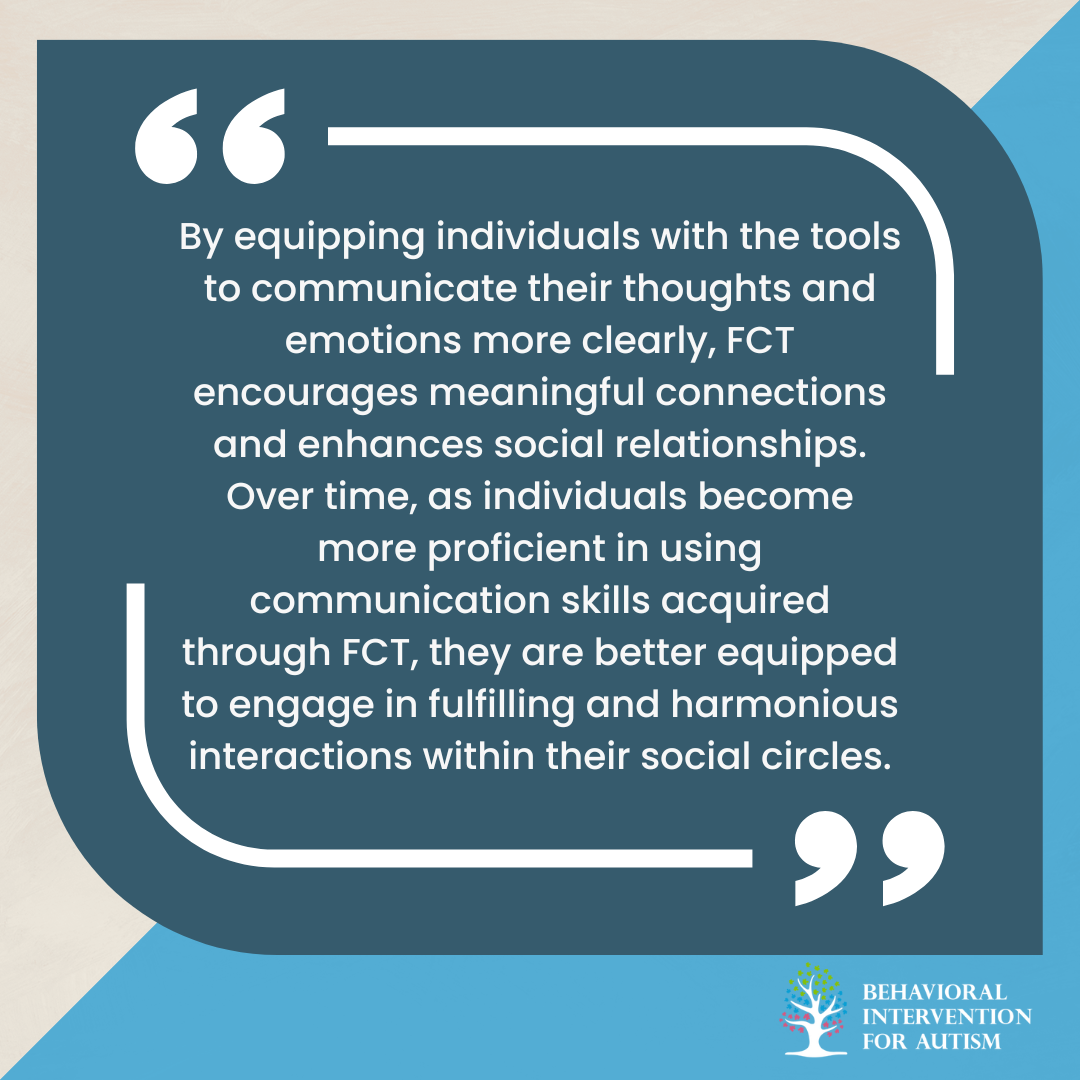
Table of Contents
In the realm of Applied Behavior Analysis (ABA) therapy, Functional Communication Training (FCT) plays a crucial role in supporting individuals with Autism Spectrum Disorder (ASD). Let’s delve into the principles that underpin FCT and its significance in the context of ABA therapy.
Introduction to Functional Communication Training
Functional Communication Training (FCT) was developed in 1985 by Carr and Durand as a component of Applied Behavior Analysis (ABA) aimed at addressing challenging behaviors exhibited by individuals with Autism Spectrum Disorder (ASD). The core principle of FCT revolves around teaching alternative and functional communication skills to replace problematic behaviors. It recognizes that challenging behaviors often stem from communication difficulties inherent in autism.
Importance of FCT in ABA
FCT holds immense importance within the framework of ABA therapy for individuals with ASD. This approach focuses on teaching meaningful and functional communication skills to children with autism and other developmental disorders. By equipping individuals with alternative ways to communicate their needs and desires, FCT helps in replacing challenging behaviors with suitable communication responses.
In the context of FCT, the identification of communication responses is a critical step towards promoting effective communication. These responses can encompass various forms of communication beyond verbal interactions, such as sign language, gestures, or visual aids like the Picture Exchange Communication System (PECS). By providing individuals with ASD alternative means to express themselves, FCT aims to alleviate frustration and reduce instances of inappropriate behaviors stemming from communication challenges.
Through the implementation of FCT in ABA therapy, individuals with ASD are empowered to communicate effectively, fostering positive interactions and enhancing their overall quality of life. The emphasis on functional communication skills not only aids in addressing challenging behaviors but also paves the way for improved social engagement and interaction within various settings.
Implementing FCT
Implementing Functional Communication Training (FCT) in Applied Behavior Analysis (ABA) therapy involves several key steps to effectively address challenging behaviors in individuals with Autism Spectrum Disorder (ASD).
Functional Communication Assessment
A crucial component of FCT is conducting a functional communication assessment to understand the underlying function of a child’s challenging behaviors. This assessment is essential in identifying the purpose of the behavior, which can range from seeking attention, avoiding tasks, or requesting desired items. By pinpointing the root cause of the behavior, therapists and caregivers can tailor interventions that focus on teaching the individual appropriate communication skills as an alternative to the challenging behavior.

Identifying Communication Responses
Once the function of the challenging behavior has been determined, the next step in the FCT process involves identifying appropriate communication responses. This step entails finding alternative ways for individuals to express their needs and desires effectively. Communication responses can vary depending on the individual’s preferences and abilities, and may include verbal communication, sign language, picture communication, or other augmentative and alternative communication (AAC) methods. The goal is to teach individuals functional communication skills that will help them effectively communicate their needs and wants in a socially appropriate manner.
Replacement of Challenging Behaviors
In FCT, the ultimate objective is to replace challenging behaviors with more appropriate communication responses. By ignoring the challenging behavior and reinforcing the desired communication response, individuals are encouraged to use more adaptive ways to express themselves. This process not only helps reduce problem behaviors but also equips individuals with ASD with the necessary tools to engage in successful social interactions and navigate daily life more effectively. Reinforcement techniques, such as positive reinforcement and shaping, play a vital role in strengthening the desired communication responses and diminishing the occurrence of challenging behaviors.

Benefits of FCT
FCT in ABA therapy offers a range of benefits for individuals with autism spectrum disorder (ASD), their caregivers, and the broader community. Let’s delve into the three key advantages of Functional Communication Training (FCT): improving communication skills, reducing challenging behaviors, and promoting positive interactions.
Improving Communication Skills
Functional Communication Training (FCT) plays a pivotal role in enhancing the communication skills of individuals with autism. By teaching alternative and effective ways to express needs and desires, FCT empowers individuals to communicate in socially appropriate ways. While the progress may vary for each individual, consistent implementation of FCT can lead to significant improvements in expressive and receptive communication abilities.
Reducing Challenging Behaviors
One of the primary objectives of FCT is to decrease challenging behaviors commonly exhibited by individuals with ASD. By providing them with strategies to communicate their needs effectively, FCT helps to diminish frustration and anxiety, which are often triggers for challenging behaviors. Through the replacement of negative behaviors with functional communication responses, individuals can learn to navigate their environment more adaptively and reduce instances of maladaptive behaviors.
Promoting Positive Interactions
Incorporating FCT into ABA therapy not only fosters effective communication but also cultivates positive interactions among individuals with autism, their peers, and caregivers.

Case Studies of FCT
Functional Communication Training (FCT) has made significant strides in enhancing communication skills and reducing challenging behaviors in individuals with autism. Through success stories of FCT implementation and its impact on individuals with autism, we can see the positive outcomes of this approach.
Success Stories of FCT Implementation
One notable success story involves a young child with autism who previously engaged in frequent tantrums and self-injurious behaviors when unable to effectively communicate his needs. By implementing FCT strategies and identifying appropriate communication responses, the child learned to use a communication device to express his desires, leading to a significant reduction in challenging behaviors.
Another inspiring case study showcases a teenager with autism who struggled with social interactions and expressing emotions. Through tailored FCT interventions and reinforcement techniques, the individual made remarkable progress in developing functional communication skills, fostering meaningful connections with peers and family members.
Impact on Individuals with Autism
The impact of FCT on individuals with autism is profound, with documented improvements in various aspects of their lives. By focusing on improving communication skills, FCT not only enhances their ability to express needs and desires but also promotes independence and self-advocacy.
Studies have shown that individuals with autism who undergo FCT experience a significant reduction in challenging behaviors, leading to a more positive and engaging social environment. By replacing ineffective communication methods with functional alternatives, these individuals can navigate daily challenges more effectively and participate more fully in social interactions.
Moreover, FCT plays a crucial role in empowering individuals with autism to communicate their thoughts, feelings, and preferences, ultimately enhancing their quality of life and promoting a sense of self-worth and confidence. By equipping them with the tools and strategies to effectively communicate, FCT paves the way for greater independence and social integration for individuals with autism.
Functional Communication Training (FCT) is an essential component of ABA therapy, helping individuals develop effective communication skills tailored to their unique needs. By implementing FCT within our ABA programs in Florida, we empower individuals to express their needs and feelings, reducing challenging behaviors associated with communication difficulties.
Our dedicated team at Behavioral Intervention for Autism focuses on creating personalized strategies that promote positive interactions and enhance overall quality of life. We are committed to delivering exceptional services that truly make a difference. If you’re interested in learning more about how our programs can benefit you or your loved one, reach out to us today!
- 9 Common Obsessions of Children With Autism You Should Know - February 25, 2025
- What is Neurodiversity? A Guide to Embracing Differences - February 25, 2025
- Understanding Hyperfocus in Autism: What It Means and Why It Happens - February 25, 2025
